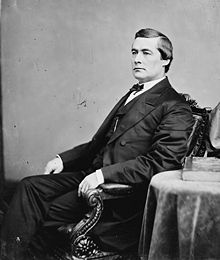Edmund Gibson Ross
Edmund Gibson Ross (born December 7, 1826 in Ashland , Ohio , † May 8, 1907 in Albuquerque , New Mexico ) was an American politician and governor of the New Mexico Territory from 1885 to 1889 . He was best known for his vote saving President Andrew Johnson from impeachment in 1868 .
Early years and political advancement
Edmund Ross completed an apprenticeship in the printing industry in Sandusky . Then he got into the newspaper business. After moving to Milwaukee , Wisconsin in 1849, he worked for the Milwaukee Sentinel newspaper. In 1856 he moved to Topeka in what was then the Kansas Territory . With the help of the Topeka Tribune newspaper, he supported the Northern Party in the midst of the turmoil of the bloody clashes between supporters from the North and the South. In 1859 he founded another newspaper, the Kansas State Report.
Between 1859 and 1861, Republican Ross was a member of the Kansas Constituent Assembly. He also became a director of a railway company. Between 1862 and 1865 he took part in the American Civil War. In the army of the Union he rose from simple soldier to major. After the war, he returned to the newspaper business.
The impeachment proceedings against President Johnson
In 1866, after the suicide of Senator James Henry Lane , Edmund Ross was sent to the US Senate to represent Kansas . He stayed there between 1866 and 1871. During this time, the impeachment proceedings initiated by the radical Republicans against President Andrew Johnson fell . The background to this process were political differences over the reconstruction policy. Similar to the assassinated President Abraham Lincoln , President Johnson held a more liberal and moderate policy towards the defeated southern states . The radical Republicans wanted a harsh policy of punishment that would also benefit the Northern economies and industries. One of its leaders was Secretary of War Edwin M. Stanton , whom Johnson dismissed without Senate approval. However, this was provided for by the Tenure of Office Act issued in 1867 (later repealed) .
With their majority in the legislature, the radical Republicans now tried to remove President Johnson from office. After six MPs from their own party had already refused to approve this plan, they only had a single vote ahead of them to get the majority needed to remove the president. In this situation, Edmund Ross decided to vote for President as well. With that he saved Johnson's presidency, which lasted until March 1869. At the same time he made many enemies with his party. Stanton now had to give up his office and Ross was no longer elected to the Senate in 1870. Most historians today agree that Ross made the right decision because the indictment against the president was politically motivated and he was not accused of a violation of the Constitution. The motives for Ross's behavior are controversial. Some historians believe he hoped he would gain advantage from his voting behavior through a concession from Johnson. Other historians simply assume that he is honest by assuming that he has recognized the illegality of the charge. The latter also includes John F. Kennedy , who mentions Ross as a brave senator in his 1956 Pulitzer Prize-winning book Profiles in Courage.
Another résumé
After his failed re-election to the US Senate, Ross initially returned to the newspaper business. After much hostility from the ranks of the Republican Party, which was connected with his behavior in the case against President Johnson, he drew closer and closer to the Democrats . Between 1871 and 1893 he was editor of several newspapers. In 1880 he ran unsuccessfully for the Democratic Party for governor of Kansas. In 1872 he moved to Albuquerque, New Mexico Territory. There, too, he initially worked in the newspaper business. In 1885, President Grover Cleveland made him the new Territorial Governor of the area. He held this office for four years until 1889. He remained in New Mexico after serving as governor and died in Albuquerque in 1907.
Web links
- Edmund Gibson Ross in the Biographical Directory of the United States Congress (English)
- Edmund G. Ross in the database of Find a Grave (English)
| personal data | |
|---|---|
| SURNAME | Ross, Edmund Gibson |
| BRIEF DESCRIPTION | American politician |
| DATE OF BIRTH | December 7, 1826 |
| PLACE OF BIRTH | Ashland , Ohio |
| DATE OF DEATH | May 8, 1907 |
| Place of death | Albuquerque , New Mexico |


